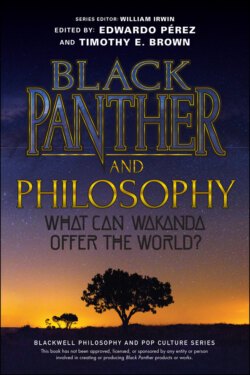Читать книгу Black Panther and Philosophy - Группа авторов - Страница 38
What about African Philosophy?
ОглавлениеW’Kabi speaks in isiXhosa, but has he heard of ubuntu? IsiXhosa is a Bantu language of the Xhosa people, spoken mainly in the Eastern Cape Province of South Africa. Beyond South Africa, some may have heard of the term ubuntu, whether it be through using the open-access software by that name, following the vibrant former Archbishop Desmond Tutu, or receiving something like a gift soap or tea labelled as Ubuntu soap! The typical South African will have grown up with the moral ethic of ubuntu as a commonplace feature: “I am because we are, and since we are, therefore, I am,” motho ke motho ka batho babang (isiXhosa); umuntu ngumuntu ngabantu (isiZulu).3 Afro-Canadian philosopher Edwin Etieyibo explains, “Ubuntu reflects the life experiences and histories of people in sub-Saharan Africa and defines the individual in terms of humanity or interdependency with others.”4
In African philosophy, scholars often analyze or draw from proverbs and language use as a way to explore moral and political principles within an oral tradition. Because the characters of Wakanda are speaking a traditional African language, it is particularly important to consider proverbs and linguistic usage. Certain principles and approaches to life are contained within the language, the way of speaking. It is striking therefore that the character W’Kabi speaks isiXhosa but seems not to have heard of one of its key guiding values. Let me elaborate.
Philosophers in recent decades have explored the concept of ubuntu to unpack its moral and philosophical implications and to consider its modern-day application. A core idea of ubuntu is that one’s humanity is intricately bound up with the humanity of the other. As Etieyibo observes, in order to be a person, one has to establish “human relations.”5 To be human, as ubuntuism holds, is to “affirm one’s humanity by recognizing the humanity of others and, on that basis, establish relations with them.”6 Basic terms of such a relationship are expressed in the form of toleration, sharing, charity, respect, acceptance, hospitality, compassion, reconciliation, empathy, and reciprocity.7 Or, as T’Challa says in the closing scene of the film, “We must find a way to look after one another as if we were one single tribe.”
To be sure, traditional African societies were not homogeneous, nor were they entirely peaceful. Philosophers do not want to claim that all Africans lived in the perfect spirit of ubuntu before colonial interventions. Indeed, wars between different groups were common.8 African philosophers also do not want to argue that pre-intervention society was inherently good and worthy of emulating. Such a “narrative of return,” which essentializes what it means to be African and values principles only because they are traditional, would be misguided.9 We can think here of how T’Challa comes to believe the traditional ways of his ancestors were wrong. Yet, we should nevertheless engage with what seems historically to have been a way of seeing the world and organizing society and consider the underlying values and their potential – especially when those philosophies and ways of life have typically been erased. In what follows, I present three examples of African philosophy on the question of our global duties, and highlight how they feature core values of relatedness, mutuality, and a sense of shared humanity.
